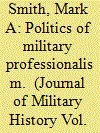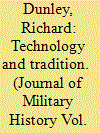| Srl | Item |
| 1 |
ID:
145259


|
|
|
|
|
| Summary/Abstract |
The Naval Consulting Board, a civilian brain trust headed by Thomas Edison, was established by Secretary of the Navy Josephus Daniels in July 1915 to advise on naval warfare technology. This article turns conventional wisdom on its head, making the case that the impetus behind its creation came not from the government but from Edison’s chief engineer, Miller Reese Hutchison, who conceived it as the centerpiece of a marketing strategy to sell Edison submarine batteries to the navy. After submarine E-2 exploded in January 1916, the navy discontinued the use of Edison batteries and its investigation permanently soured Edison on the U.S. Navy.
|
|
|
|
|
|
|
|
|
|
|
|
|
|
|
|
| 2 |
ID:
145260


|
|
|
|
|
| Summary/Abstract |
The exiled navies of many Allied nations came under British operational control in World War II. Six of these contributed significant proportions of their submarine fleets to the Mediterranean, where there was great need for them, yet troubled relations meant multinational naval cooperation (MNC) was often extremely difficult. British attempts to establish structures to improve this were frequently hampered, while perceived differing strategic “worth” led the British to treat their new allies in an unequal manner. Ultimately, while MNC was broadly successful in the British home theatre, it was much less effective in the Mediterranean and valuable resources subsequently went underused.
|
|
|
|
|
|
|
|
|
|
|
|
|
|
|
|
| 3 |
ID:
145261


|
|
|
|
|
| Summary/Abstract |
In the fall of 2015, the Acting Under Secretary of Defense, Brad Carson, chaired a series of lectures on Clausewitz’s theories at the Pentagon. On 11 December, Peter Paret gave the concluding talk, in which he traces the development of some of Clausewitz’s ideas from the 1790s to the early 1830s, and reflects on the extent and kind of their relevance today.
|
|
|
|
|
|
|
|
|
|
|
|
|
|
|
|
| 4 |
ID:
145257


|
|
|
|
|
| Summary/Abstract |
This article examines how the political activities of antebellum U.S. engineering officers on behalf of the Engineer Company demonstrate the range of mid-nineteenth-century military professionalism. These efforts indicate their sense of a professional responsibility to provide the nation with the military capability to defend itself, but this lobbying was circumscribed by the engineers’ awareness that as officers they had to remain subordinate to the civil government and its policies. This tension can be seen in the methods officers selected for their lobbying and in the internal politicking within the U.S. Army Corps of Engineers over the company’s proper role.
|
|
|
|
|
|
|
|
|
|
|
|
|
|
|
|
| 5 |
ID:
145256


|
|
|
|
|
| Summary/Abstract |
Arguably the greatest self-inflicted catastrophe in human history, the Second World War resulted in an estimated 60 million dead. Unprepared when the war began, the United States quickly gathered momentum to become the decisive economic power, with an unprecedented ability to project that power through the Atlantic, the Pacific, the Mediterranean, and elsewhere. While in the European theater the Soviet Union emerged as the preeminent killing power among the Allies, the United States demonstrated logistical brilliance, firepower, mobility, mechanical aptitude, and an economic preponderance that produced much more than the Axis powers, all while committing a smaller proportion of the country’s gross domestic product to the war than any other major belligerent.
|
|
|
|
|
|
|
|
|
|
|
|
|
|
|
|
| 6 |
ID:
145258


|
|
|
|
|
| Summary/Abstract |
Naval power projection operations were an important tool in Victorian Britain’s strategic arsenal. From the 1860s technological change in the form of mines presented a major threat to the Royal Navy’s strategy of coastal assault. In order to continue to operate in this environment the Royal Navy proactively engaged with mining technology. Through this process it shaped the new technology to suit its particular strategic and cultural requirements. The war scares with Russia in 1878 and 1885 provided the impetus to operationalise these developments and highlighted how the Royal Navy and its coastal assault strategy remained an important facilitator of British policy.
|
|
|
|
|
|
|
|
|
|
|
|
|
|
|
|